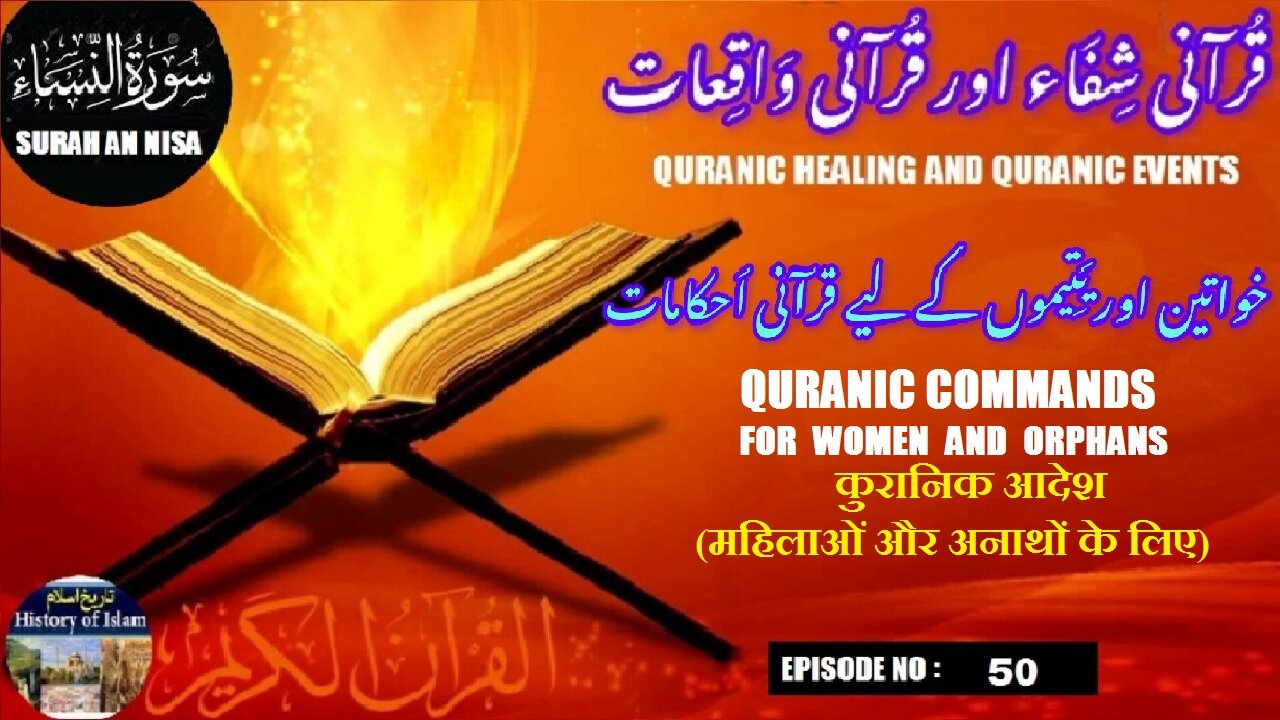Premium Only Content

Quranic Commands for women & orphans महिलाओं और अनाथों के लिए عورتوں اور یتیموں کے لیے قرآنی احکام
@islamichistory813 #quranic #justice #for #women #and #orphans #healing #and #events #from #the #quran #historical #stories #and #events #quranicstories #selfhealing #success #stories #striking #events #in #history #quranstories, #storiesfromthequran #religious #creation #stories #trending #quran #short #historical #loves #historical #heroes #what #is #true #strength #calm #quran #recitation #for #babies #islamic #healing
Quranic Justice for Women and Orphans; Surah An-Nisa’s Command (4:2)
Assalamu Alaikum, wa Rahmatullahi wa Barakatuhu.
Brothers, sisters, friends and elders, we are presenting the 50th episode of the Islamic informative video based on healing and events from the Holy Quran, and in this episode we will describe, Quranic Justice for Women and Orphans | Surah An-Nisa’s Command (4:2)
Quranic Treatment of Women and Orphans: Give Orphans Their Wealth When They Come of Age (Surah An-Nisa 4:2)
The Holy Quran, as the divine guidance for all of humanity, places immense emphasis on the fair and just treatment of the weak and vulnerable, particularly women and orphans. Among the many groups the Quran repeatedly seeks to protect, orphans occupy a special place. In pre-Islamic Arabia, orphans were often exploited, their rights overlooked, and their inherited wealth consumed by guardians without accountability. Islam came with a revolutionary message to restore their dignity and safeguard their assets. One of the earliest and clearest commands concerning the rights of orphans is found in Surah An-Nisa (4:2), where Allah says: *“Give the orphans their wealth when they reach maturity, and do not exchange the bad for the good, nor consume their wealth into your own. Surely, that is a great sin.”* This verse firmly establishes the ethical and legal obligation of guardians to treat orphaned children with justice, respect, and trust, and to return their property to them once they come of age and are capable of managing it responsibly.
The phrase *“give the orphans their wealth when they reach maturity”* clearly defines both the right of the orphan and the duty of the guardian. In Islam, guardianship over an orphan is not ownership; it is a trust (amanah). The guardian is entrusted with the responsibility of caring for the orphan and protecting their wealth until they are old enough to handle it on their own. Maturity, in Islamic terms, refers not only to physical age but also mental soundness and financial understanding. This command protects the orphan’s wealth from long-term misuse and gives the orphan dignity and autonomy as they transition into adulthood. It also reflects Islam’s commitment to personal rights, property rights, and the overall protection of vulnerable individuals in society.
The verse further instructs, *“do not exchange the bad for the good,”* a warning against dishonesty and deceit. This phrase implies that some guardians would replace the valuable assets of the orphans with inferior ones from their own possessions—an act of calculated fraud. This practice was a form of theft masked as trade or inheritance settlement. Islam strictly forbids this behavior, condemning it not just as unethical but as spiritually criminal. The Quran categorically forbids any form of manipulation that leads to an orphan being deprived of what is rightfully theirs. Fair dealing, transparency, and sincerity are essential components of a believer’s interaction with those under their care.
The verse concludes with a severe warning: *“Surely, that is a great sin.”* By labeling the act of consuming orphan wealth unjustly as a major sin, the Quran raises awareness of the spiritual gravity of such injustice. This not only sets a moral standard but also creates a fear of divine punishment for those who might consider exploiting orphaned children. Other verses in the Quran further reinforce this message. In Surah Al-Baqarah (2:188), Allah warns against consuming one another’s property unjustly, and in Surah Al-Takwir (81:8-9), the innocent are reminded as victims of social injustice, reinforcing that every soul will be held accountable for its treatment of others.
In addition to protecting orphans’ wealth, Islam also elevated their social status. Caring for an orphan is regarded as a noble act of charity and devotion. The Prophet Muhammad (peace be upon him) said, *“I and the one who cares for an orphan will be in Paradise like this,”* and he held his two fingers close together to illustrate the closeness. This hadith not only highlights the reward of caring for orphans but also encourages the Muslim community to view it as a source of honor, not burden. Instead of exploiting their vulnerability, Islam calls for compassion, empathy, and full protection of their rights.
Surah An-Nisa is named after “the women” and repeatedly emphasizes the Quranic mission to uplift and safeguard the rights of both women and orphans. It begins by calling on humanity to be mindful of their duties to relatives, orphans, and the needy. Islam was unique for its time in formalizing women’s and orphans’ inheritance rights. The Quran specifically allocates shares of inheritance for them in verses that follow, rejecting the pre-Islamic practices of denying women and children any share in family wealth. By introducing mandatory inheritance shares, establishing rules for guardianship, and declaring the misappropriation of orphans’ wealth as a grave sin, the Quran laid the groundwork for an equitable society built on accountability, care, and justice.
In conclusion, Surah An-Nisa (4:2) offers a powerful command that reflects the Quran’s broader vision of justice, especially for the marginalized. Giving orphans their wealth when they come of age is not just a legal duty—it is a spiritual obligation, a moral trust, and a social responsibility. It encapsulates the Quran’s deep concern for protecting the rights of those who cannot yet protect themselves. Through such verses, Islam not only reformed the social norms of the time but also presented eternal principles of justice, mercy, and trustworthiness that remain vital in every era.
With this, we ask for your permission until tomorrow and pray to Allah Almighty to grant us the ability to act on the Quran and Hadith, Amen
Allah Hafiz
============================
-
 10:35
10:35
ISLAMIC HISTORY
1 day agoIslamic History Episode 231 Assassination of Abbas bin Mamun अब्बास बिन मामून عباس بن مامون کا قتل
25 -
 LIVE
LIVE
Rallied
1 hour ago $0.05 earnedWarzone Challenges All Night
131 watching -
 LIVE
LIVE
DLDAfterDark
2 hours ago $0.07 earnedWhat Are We Missing From The Charlie Kirk Incident? Feat. TN Tactical - After Hours Armory Live!
317 watching -
 16:23
16:23
True Crime | Unsolved Cases | Mysterious Stories
1 month ago $0.11 earnedThe Strange Disappearance of Mekayla Bali | (Mini-Documentary)
9.5K1 -
 10:03
10:03
nospeedlimitgermany
12 days ago $0.02 earnedVW Golf 5 R32 | 250 PS | Top Speed Drive German Autobahn No Speed Limit POV
9.4K2 -
 1:35
1:35
Memology 101
1 day ago $0.24 earnedChicago Mayor Johnson calls LAW ENFORCEMENT a "SICKNESS" he will "ERADICATE"
9.05K19 -
 10:17
10:17
Advanced Level Diagnostics
13 days ago2007 Chevy Express - Replaced Everything But The Code Remains!
9.6K -
 1:01:11
1:01:11
The Mel K Show
3 hours agoMel K & Harley Schlanger | History Repeats: A Wake-Up Call for Humanity | 9-20-25
79.4K19 -
 2:13:52
2:13:52
Mally_Mouse
11 hours ago🌶️ 🥵Spicy BITE Saturday!! 🥵🌶️- Let's Play: Lockdown Protocol (New Updates!)
84.3K5 -
 12:57
12:57
Culture Apothecary with Alex Clark
1 day agoMy Last 6 Years With Charlie Kirk | In Memoriam with Alex Clark
34.8K7